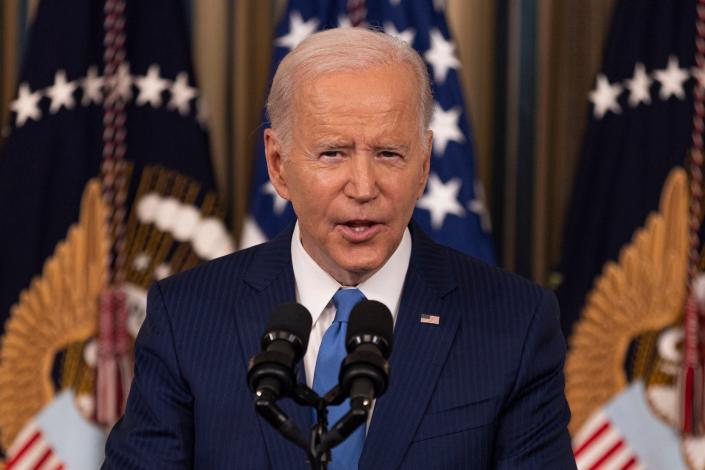A long-anticipated meeting between US President Joe Biden and Chinese President Xi Jinping, set for Monday in Indonesia, is expected to include discussions on Taiwan, human rights, Ukraine and harmful economic practices with a goal of “building a floor” under the strained relationship between the world’s two largest economies, a senior US official said Thursday.
No joint statement or major outcomes are expected out of the first face-to-face sit-down since Biden took office in January 2021 and the main purpose will be to open – and keep open – communication, the official added.


Biden during a news conference on Wednesday following the 2022 midterm elections. Photo: Xinhua alt=Biden during a news conference on Wednesday following the 2022 midterm elections. Photo: Xinhua>
“One of the main objectives is really about deepening their understanding of one another’s priorities and intentions and, where possible, with the goal of reducing misunderstandings and misperceptions,” the official said.
Do you have questions about the biggest topics and trends from around the world? Get the answers with SCMP Knowledge, our new platform of curated content with explainers, FAQs, analyses and infographics brought to you by our award-winning team.
“I don’t in any way think that the two leaders are going to sit down and be able to solve all their differences or problems. But I do think that some of these steps could be important along the way.”
The Monday face-to-face will be held ahead of the Group of 20 meeting of major economies on Indonesia’s tropical island of Bali on Tuesday and Wednesday.
The two leaders are also expected to discuss strategic stability, managing strategic risk and ways they can try to cooperate on issues of common concern – notably North Korea’s recent missile launches given Beijing’s concern over regional stability, and climate measures, with the COP27 global climate conference now under way in Egypt.
But the discussions is likely to be at a broader, more theoretical level. “This is really not a meeting that’s being driven by deliverables,” the official said.
“The most important thing is enabling the two leaders to have a meaningful, substantive, in-depth and candidly private conversation, to be able to, you know, judge one another for themselves.”


US House Speaker Nancy Pelosi speaking during a meeting with Taiwanese President President Tsai Ing-wen in Taipei. on August 3. Pelosi’s trip outraged Beijing, which cut off several dialogues with the US as part of its response. Photo: Taiwan Presidential Office via AP alt=US House Speaker Nancy Pelosi speaking during a meeting with Taiwanese President President Tsai Ing-wen in Taipei. on August 3. Pelosi’s trip outraged Beijing, which cut off several dialogues with the US as part of its response. Photo: Taiwan Presidential Office via AP>
While the two global powers are too far apart on many issues to expect any breakthrough out of a meeting, analysts said the mere fact that the leaders are talking is a positive after several rough months.
China has made clear its displeasure about the trip House Speaker Nancy Pelosi, third in line to the presidency, took to Taiwan in early August. The trip by so senior a US official was not unprecedented – then-speaker Newt Gingrich visited in 1997 – but China is far more powerful now and more willing to show its anger.
And it did this in pointed fashion, staging unprecedented live-fire military exercises on all sides of Taiwan, measures military analysts said were meant to suggest China’s growing ability to stage a naval blockade in the event of an actual invasion.


Multiple military drills took place in six areas surrounding Taiwan, according to the PLA’s Eastern Theatre Command, since soon after US House Speaker Nancy Pelosi left Taipei in early August. Chart: Xinhua alt=Multiple military drills took place in six areas surrounding Taiwan, according to the PLA’s Eastern Theatre Command, since soon after US House Speaker Nancy Pelosi left Taipei in early August. Chart: Xinhua>
It also cut off cooperation in areas such as climate change and severed most communication, including those between the world’s two largest militaries.
For its part, Washington viewed this latest example of China’s chest-thumping as irresponsible and dangerous – capped by Beijing’s refusal to answer the phone – and one reason to map out the nations’ “red lines” when they meet in Indonesia.
“We thought it was inappropriate and an overreaction,” the official said on Thursday of the Taiwan Strait drills. “But more than anything, we just don’t believe that communication channels should be turned on and turned off in times of tension, particularly things like the mil-mil channels, which are perhaps most important in times of tension.”
China considers Taiwan a breakaway province to eventually be united with the mainland, by force if necessary. Few countries, including the US, recognise the self-governing island as an independent state.
But Washington is obliged by law to support Taiwan’s defence capability and has a policy of supporting Taipei’s expanded presence in global health, crime prevention and aviation issues – objectives Beijing opposes.
While recent US national security documents and White House statements have underscored the importance of limiting China’s access to the most advanced semiconductors, chip-making tools and quantum computing technologies, the official said these were limited in scope.
“To be clear, our policy is not containment,” the official said. “Our concern is with certain high-end technologies that feed into Beijing’s development of high-end military applications”.
Analysts had low expectations for the meeting.
“I’m not particularly optimistic,” said Evan Medeiros, a Carnegie Endowment for International Peace fellow, adding that all the strategic irritants remained, including Taiwan, US domestic politics and China’s military expansion and nuclear build-up.
“It will buy time,” Medeiros, who served on the National Security Council under former president Barack Obama, added. “Opening up communications with China, as a veteran of the Obama administration, doesn’t really solve problems. Sometimes it’s just a way to let a little steam out of the valve.”
Biden would come to the meeting somewhat weakened by the midterm election results, given the likelihood that his Democratic Party will lose its control in the House and possibly the Senate. But the Democrats also did far better than the blowout losses that had been widely predicted, given the historical patterns for presidents midway through their term.


Xi presiding over an event introducing new members of the Politburo Standing Committee at the Great Hall of the People in Beijing on October 23. Photo: AP alt=Xi presiding over an event introducing new members of the Politburo Standing Committee at the Great Hall of the People in Beijing on October 23. Photo: AP>
Xi ostensibly arrives with a more powerful hand, having gained an unprecedented third term at the 20th Party Congress last month and completely filling the powerful Standing Committee with allies.
Even so, there is growing discontent domestically over his administration’s unwavering enforcement of the nation’s zero-Covid policy; partly as a result, the prodigious Chinese economy is on its heels amid high unemployment, capital outflow and swooning markets.
The US official declined to discuss Washington’s view of where Xi stands after the Communist Party congress, adding that communication was still hampered given that China’s leadership transition continues. While top party positions were announced last month, new senior government posts will not be outlined until next spring.
“I certainly am not going to comment on internal CCP politics,” the official said. “But I think we all know that, in the [Chinese] system, and certainly at this moment in time, President Xi is the key official to be engaging.”
“That’s why we think leader-to-leader engagement is the most important channel.”
The G20 could be a global coming-out party of sorts for Xi following last month’s party congress as he tries to reduce tensions with the US, charm developing countries and showcase his new-found stature, analysts said.
As such, any renewed focus on global issues that have fallen victim to the US-China stand-off, including climate change, would be a huge step forward, said Stewart Patrick, a Council on Foreign Relations member and former State Department official.
Others said they would watch to see what Xi does with his growing power.
“Does he recognise that a stable relationship with America should be a core of interest of China’s?” said Susan Shirk, a professor at the University of California, San Diego.
“And if he does, will he have that pragmatic gene that previous leaders had in their willingness to be flexible, make compromises, engage in normal diplomacy in order to resolve our differences?”
Both sides had been cagey about committing to the meeting, which was rumoured for months, as relations hit new lows.
Some of the caution related to the lack of trust. Other factors relate to domestic politics.
Biden is wary of looking weak on China with his congressional mandate expected to erode once all votes from Tuesday’s midterm elections are counted. “I’m not willing to make any fundamental concessions” to Beijing, he told reporters Wednesday during a post-election news conference at the White House.
And China is concerned that any compromise on its part to lower the temperature could prove short-lived, met by a potentially insincere US response, that could prove embarrassing and anger Chinese hardliners.
Fresh in Beijing’s memory are events of less than a year ago, when the two leaders held a virtual meeting in November and pledged to “manage competition responsibly” only to have the Biden administration announce, three weeks later, a diplomatic boycott of the Beijing Winter Olympics.
As the two sides scramble to finalise specifics for a high-stakes session only announced four days before it is set to occur, the US official declined to say whether Beijing had insisted that Biden and others in the US delegation follow China’s strict zero-Covid protocols or use Chinese vaccines for the meeting with Xi.
“I’m not going to get into the details,” the official said. “We have Covid protocols, they have Covid protocols. I think they’re under discussion.”
Additional reporting by Robert Delaney
This article originally appeared in the South China Morning Post (SCMP), the most authoritative voice reporting on China and Asia for more than a century. For more SCMP stories, please explore the SCMP app or visit the SCMP’s Facebook and Twitter pages. Copyright © 2022 South China Morning Post Publishers Ltd. All rights reserved.
Copyright (c) 2022. South China Morning Post Publishers Ltd. All rights reserved.




